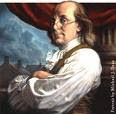Benjamin Franklin used humor as a rhetorical device and swayed the reader toward the acceptance of his personal thoughts and ideas. He effectively wrote satires. Examples can be found throughout Franklin’s literary pieces. In “A Witch Trial at Mount Holly,” Franklin highlighted the hypocrisy of Puritan culture through satire. Being a master of humor in his writings, Benjamin Franklin persuaded his audience through a distinct and profound rhetorical device.
Characterized by his political ability, Benjamin Franklin highlighted the superstition and hypocrisy of the Puritan culture. In “A Witch Trial at Mount Holly,” Franklin described 300 people who were gathered to witness a trial of two people, a man and a woman, accused of witchcraft. At first they were weighed against the Holy Bible. Common knowledge allowed the reader to realize that a largest Bible would not weigh more the 50 pounds and the average weight of the smallest adult would be no less than 90 pounds. The difference in the weight would prove that the test was flawed and comical.
Also in the “A Witch Trial at Mount Holly,” the accused were tied and thrown into the water. If they floated in the water, well then, they were witches. Again, common sense allowed the reader to realize that any human being with the capacity to do so would swim in order to save his or her life. A human being would only be able to float at the point death when the equilibrium of the water and body became one. The sensible reader challenged the validity of the test and realized the dishonor in the Puritan practice.
Another dishonorable practice exposed by Franklin in the text was the dishonoring of the female body. The exposed nudity and degradation of the female body expressed by the Puritan culture was shameful. In a comical way, Franklin described that the women needed to be re-tested, fully “naked” before the masses. The female body should be revered but Franklin used the incident in a satirical sense. It was a powerful rhetorical tool to sway the meekest audience.
Subscribe to:
Post Comments (Atom)









No comments:
Post a Comment